Politics
Parliament under spotlight in new phase of ‘terror-free Türkiye’
The Turkish Parliament delayed its summer recess on Wednesday while lawmakers from a party linked to the PKK terrorist group met the parliament speaker on Thursday with the agenda of the “terror-free Türkiye” initiative. Developments point out that Parliament will likely establish a committee on advancing the initiative that aims to end a campaign of violence plaguing Türkiye since the 1980s.
Parliament Speaker Numan Kurtulmuş met lawmakers Pervin Buldan and Mithat Sancar from the Peoples’ Equality and Democracy Party (DEM Party), which seeks the formation of a parliamentary committee exclusively to tackle the initiative. The initiative was launched by Devlet Bahçeli, head of the Nationalist Movement Party (MHP), last year. The DEM Party acted as “messenger” between the PKK’s jailed ringleader Abdullah Öcalan and Turkish politicians and the public in general after Öcalan agreed to Bahçeli’s proposal to call on the PKK to lay down arms. The terrorist group in May announced that it would dissolve itself, though its next steps remain unclear. Turkish authorities have confirmed that the group’s disarmament would take place in Iraq and Syria, and Turkish intelligence would coordinate the handover of weapons.
Speaking after their meeting with Kurtulmuş, Buldan told reporters that they discussed the current stage of the initiative, describing it as a “positive meeting.” Buldan said they were also planning to hold talks with Bahçeli, President Recep Tayyip Erdoğan and main opposition Republican People’s Party (CHP) leader Özgür Özel in the coming days to discuss a terror-free Türkiye. Sancar said Parliament would play a crucial role in the initiative. The DEM Party pursues greater transparency in the initiative, while the government favors a cautious approach, as earlier attempts to dissolve the PKK without a strictly military approach have failed. The DEM Party, which has intricate links with the terrorist group, also aims to ensure accountability for the initiative, which was mostly based on informal steps so far, as the terrorist group, naturally, is not recognized as “a party” to an agreement, in accordance with Türkiye’s refusal to negotiate with terrorist groups.
Politics
Turkish nationwide ops net 361 suspected FETÖ infiltrators
Turkish authorities captured a total of 361 suspects linked to the Gülenist Terrorist Group (FETÖ) in the past two weeks, Interior Minister Ali Yerlikaya announced Friday.
The raids, which targeted FETÖ cells in 46 cities across Türkiye, including Istanbul, Ankara and Izmir, were the latest in the long-running operations against the terrorist group, which sought to seize power on July 15, 2016, through a foiled coup bid by its military infiltrators.
According to the minister, the captured suspects were wanted for serving the FETÖ network still active in Türkiye, spreading FETÖ propaganda on social media platforms, infiltrating the Turkish Armed Forces (TSK) and other financial, educational institutions, as well as contacting FETÖ handlers through payphones, and utilizing ByLock, an encrypted messaging app developed and exclusively used by the terrorist group.
The suspects were also marked as “advantageous” candidates in investigations into FETÖ’s fraud for civil servant admission exams.
FETÖ is known for stealing questions and answers to promotion exams to help its members rise in the ranks in the bureaucracy, military and law enforcement, and has been subject to numerous probes on this issue.
Yerlikaya said the suspects also included wanted fugitives who were named in testimonies in ongoing investigations.
FETÖ still has backers in army ranks and civil institutions but they managed to disguise their loyalty, as operations and investigations since the coup attempt have indicated.
The group faced increased scrutiny following the coup attempt that killed 251 people and injured nearly 2,200 others. Tens of thousands of people were detained, arrested or dismissed from public sector jobs following the attempt under a state of emergency.
Hundreds of investigations launched after the attempt sped up the collapse of the group’s far-reaching network in the country.
“With the latest operations, we can see the organization is still attempting to infiltrate various institutions,” President Recep Tayyip Erdoğan said late Wednesday on a flight back from the NATO summit in The Hague. “We have never been and never will be overcome by languor about this.”
The terrorist group faces operations almost daily as investigators still try to unravel their massive network of infiltrators everywhere but an unknown number of FETÖ members, mostly high-ranking figures, fled Türkiye when the coup attempt was thwarted.
Erdoğan also hit out at past attempts to “twist” his government’s statements to highlight the threat of FETÖ.
“But we were always ultimately proven right,” he said.
He assured authorities would root out the remaining FETÖ infiltrators in Turkish institutions, citing the “meticulous work of police and intelligence units.”
“Our struggle against FETÖ will triumph because the threat was not limited to the night of July 15,” Erdoğan said. “The enemy never sleeps, and neither do we.”
Politics
Türkiye, Australia battle to host 2026 UN climate talks
Türkiye has redoubled its efforts to host the 2026 U.N. climate talks in spite of calls to step aside and let rival bidder Australia hold the high-profile international gathering.
At a meeting of climate diplomats, Türkiye promised a world-class COP31 venue in Antalya, a seaside city that has previously hosted G-20 and NATO conferences.
“We are ready to make COP31 accessible, functional and inspiring,” Ayşin Turpancı, an official from Türkiye’s directorate of climate change, told delegates at mid-year U.N. negotiations in the German city of Bonn.
She said Türkiye’s strategic position between Europe and Asia and its ability to bridge divides between developed and developing nations made it the ideal host.
As anxiety grows over the cost and availability of accommodation for this year’s summit in the Brazilian city of Belem, she said Antalya boasted more than 600,000 hotel beds.
“The prices are able to serve participants from all levels,” she told diplomats and non-governmental representatives at a special side event in Bonn to push Türkiye’s case.
Nearly 200 nations attend the annual COP summits, which rotate through five groups of countries that must nominate, by consensus, a candidate to host the marathon climate negotiations.
The “Western European and Other States” bloc is hosting in 2026 and two bids have emerged – Türkiye and Australia, which has proposed co-hosting with neighboring Pacific Island nations.
Persistent
An Australian official in Bonn told AFP that Canberra was “working very hard to resolve the COP31 bid.”
Earlier this month, the country’s environment minister, Murray Watt, also used a platform on the world stage to push Australia’s case.
“It’s time for a climate COP in the Pacific region,” Watt told government ministers at the U.N. Ocean Conference in Nice, France. “COP31 would be an unprecedented opportunity to bring global attention to the unique challenges and opportunities in the Blue Pacific.”
The Pacific is severely threatened by rising seas and worsening storms, and many small island leaders have urged Türkiye to withdraw from the race. But Ankara shows no sign of budging.
“We reiterate our candidacy for the COP presidency,” the country’s deputy environment minister, Fatma Varank, told delegates in Bonn.
Veteran climate analyst Alden Meyer said Türkiye was “definitely being very persistent in their bid.”
“Everyone is wondering, what is the game here? What does Türkiye really want?” Meyer, from think tank E3G, told AFP in Bonn. “And it may or may not be anything related to climate,” he added, pointing to possible trade or political goals.
What is clear – a winning candidate is not now expected to be declared during Bonn as hoped, Meyer said.
“The decision may not be made until Belem, or just before,” he said.
2035 goals
Brazil is hosting COP30 in November this year on behalf of the Latin American and Caribbean region. The event holds significance as it will focus on assessing countries’ updated climate targets for 2035. Analysts have referred to it as possibly the most pivotal summit since the 2015 Paris COP, where the key climate agreement was established.
Türkiye has felt the effects of climate change, with repeated extreme weather events, including heat waves. Major Turkish lakes, such as Lake Van in the east and Lake Tuz in Central Anatolia, are drying up.
In October 2021, Türkiye became the last Organisation for Economic Co-operation and Development (OECD) and G-20 country to sign the Paris Agreement on limiting the effects of climate change.
According to official statistics, 36.2% of Türkiye’s electricity was generated from coal in 2023, and 21% from natural gas. Hydropower contributed 19.3%, wind 10%, and solar power 7%.
The government aims for solar power to generate half of the country’s electricity by 2035.
At COP29 in Azerbaijan, a group of nations, including all European Union member states, Canada, Mexico and Norway, pledged to set climate targets aligned with the Paris Agreement’s aspirational goal of limiting warming to 1.5 degrees Celsius (2.8 degrees Fahrenheit). The U.S. did not join this commitment.
Experts hailed the announcement as a positive sign, particularly as the pace of the energy transition faces challenges and the world continues to break new high-temperature records each year.
Politics
Erdoğan, Qatari emir discuss Türkiye-Qatar ties, regional issues
President Recep Tayyip Erdoğan held a phone call with Qatari Emir Sheikh Tamim bin Hamad Al Thani on Thursday, during which the two leaders discussed bilateral relations as well as regional and global developments, according to a statement from the Turkish presidency.
Erdoğan informed Al Thani that he held talks with counterparts at the NATO summit regarding the military escalation between Iran and Israel.
The leaders also reviewed the state of Türkiye-Qatar relations and ongoing diplomatic efforts amid rising tensions in the Middle East.
Ankara and Doha enjoy strong relations, particularly since the 2017 blockade of the Gulf country by Saudi Arabia and others. The two countries have strengthened military and economic ties in recent years.
Politics
Kurtulmuş urges political, social unity for new Turkish constitution
Parliament Speaker Numan Kurtulmuş on Thursday called for political and social unity in Türkiye for a new constitution.
“A brand-new civilian constitution is a crucial matter for Türkiye, and it is above parties or politics. It’s a national contract,” Kurtulmuş said at the “Türkiye’s Civil Constitutional Journey Project” event in the capital of Ankara.
Kurtulmuş pointed out that the 1982 Constitution has been subject to debate since its implementation.
“One of the most important issues of a strong Türkiye is social unity, togetherness, integration and state-nation fusion,” Kurtulmuş said and added, “There is no doubt that one of the basic elements of standing strong is a new constitution, and that there is a need for a new constitution.”
It’s vital to present a brand-new social contract that can meet the requirements of the age and demands of the people, he argued.
Constitutional reform cannot be the sole concern of any political party or political figure; it’s a common concern of 86 million people of Türkiye, Kurtulmuş said. “Therefore, we must proceed with great care without turning this into an area of political calculations.”
The government has been pushing to overhaul the Constitution for over a decade now, which was enforced in 1982 following a military coup that led to the detention of hundreds of thousands of people along with mass trials, torture and executions, which still represents a dark period in Turkish political history.
The ruling Justice and Development Party (AK Party) has a comprehensive draft prepared by a scientific council during the pandemic, which it hopes to submit to Parliament.
Last summer, Kurtulmuş oversaw talks between political parties on a constitutional overhaul and met representatives of all parties at Parliament to discuss a new constitution. He has said the general consensus was “positive” but that the main opposition Republican People’s Party (CHP) “still remains far from the table.”
The CHP is inclined to reject a constitutional overhaul, with its leader, Özgür Özel, claiming such a change has raised “other kinds of negotiations” without elaborating.
At least 400 lawmakers must ratify a new constitution draft in Parliament. Anything over 360 votes would allow a referendum, allowing the people to decide.
Politics
Türkiye supports NATO’s 5% defense budget goal
Türkiye backs NATO’s decision to more than quadruple its defense spending target to 5% of GDP by 2035 and is already surpassing the previous standard of 2%, according to a Turkish Defense Ministry source on Thursday.
NATO allies on Wednesday agreed to raise their collective spending goal to 5% of gross domestic product over the next decade, citing the long-term threat posed by Russia and the need to strengthen civil and military resilience.
“Türkiye is above the 2% target criterion under the Defence Spending Pledge,” the source said. “As NATO’s second-largest army, Türkiye is among the top five contributors to the alliance’s operations and missions.”
The source said Türkiye had fulfilled all its NATO capability targets and was continuing to invest in defense industry development and research. It plans to expand a layered air defense network across the country, centered around its national “Steel Dome” project.
“We are investing in air defense systems, hypersonic, ballistic and cruise missile capabilities, unmanned land, sea and air systems, as well as next-generation aircraft carriers, frigates and tanks,” the source said.
The new NATO target includes at least 3.5% of GDP for core defense spending, with the remainder to be spent on security-related infrastructure to improve civil preparedness and resilience.
It’s a major revamp of the way NATO calculates defense spending. Until now, the allies had set a target of 2% of gross domestic product for their defense budgets.
They’ll now be able to include weapons and ammunition they supply to Ukraine in the equation, making the new target slightly easier to reach, but still difficult for Canada and a number of European countries with economic troubles.
On top of that, the allies will dedicate 1.5% of their GDP to upgrading infrastructure – roads, bridges, ports and airfields – needed to deploy armies to the front. Money spent on protecting networks or preparing societies for future conflict can be included.
Progress will be reviewed in 2029, after the next U.S. presidential election.
Not everyone is on board. Spain officially refused the agreement. Slovakia had reservations. Belgium, France and Italy will struggle to meet the new target.
The leaders reaffirmed their “ironclad commitment” to NATO’s collective defense clause, Article 5. In recent years, U.S. President Donald Trump had sown seeds of doubt about whether the U.S. – NATO’s most powerful member – would come to the aid of any ally under attack.
Trump had appeared to condition that support on higher defense spending. With NATO’s new spending pledge in the bag, he told reporters that “I left there saying that these people really love their countries. It’s not a ripoff. And we’re here to help them protect their country.”
He added that “they want to protect their country, and they need the United States, and without the United States, it’s not going to be the same.”
Anti-Daesh coalition
The Turkish ministry sources also confirmed regional nations would form an alliance against the Daesh terrorist group, which carried out a suicide attack that killed 25 people at a Damascus church on Sunday.
Türkiye condemns the attack, which targets Syria’s social peace and unity and is a crime against humanity, the sources added.
They urged Syrian people to unite against “assaults and provocations of enemies.”.
Sunday’s attack on Mar Elias Church marked the first of its kind in Syria in years, as the capital seeks to stabilize and restore normalcy amid lingering conflict and divisions following the ouster of Bashar Assad in December.
“Türkiye has already sent military personnel to Syria that will serve in the anti-Daesh operation center,” the sources said. “A structure will be established where regional countries can jointly fight against Daesh. We will continue to cooperate with all our might to end the scourge of terrorism in Syria, as we do Türkiye.”
The sources said Türkiye would provide the Syrian government with the necessary support to fight against terrorism.
Earlier this year, Ankara confirmed a four-way coalition with Iraq, Jordan and Syria against Daesh was underway, which will include intelligence sharing and joint operations.
Daesh took over vast swathes of Syria and Iraq in 2014, but it lost its grip on the territory after campaigns by U.S.-backed forces in Syria and Iraq and Syrian forces backed by Iran, Russia and various paramilitaries.
A U.S.-led coalition force still raids Daesh cells in Syria. In addition, the U.S., under the pretext of this “fight” against Daesh, supplies military equipment and training to the PKK/YPG, a terrorist group holed out in northeastern Syria, despite protests by Türkiye, which both terrorist groups target.
As part of a “terror-free” initiative launched last year, the PKK, a designated terrorist group by Türkiye, the U.S., the U.K. and the EU, announced the historic decision last month to disarm and end its decades-long terror campaign that killed at least 40,000 people.
When asked about the status of the PKK’s dissolution, the ministry sources said the relevant Turkish authorities were monitoring the process “with great care.”
“The Turkish Armed Forces (TSK) continue to make every effort to successfully complete the process by taking the necessary measures without compromising the security of our country,” they noted.
Politics
Kılıçdaroğlu may return as chair of Turkish main opposition: Report
“This is Kemal, I am coming,” was the famed slogan of Kemal Kılıçdaroğlu when he took on President Recep Tayyip Erdoğan in the 2023 presidential elections. The former chair of the main opposition Republican People’s Party (CHP) apparently eyes another comeback. Days before a critical trial where his successor, Özgür Özel, is accused of buying votes to win over Kılıçdaroğlu in a 2023 intraparty election, the veteran politician met Özel’s “messengers.”
Three prominent figures of the party recently met Kılıçdaroğlu, according to the media reports, seeking to persuade him to publicly announce his opposition to a likely verdict in the trial that may conclude with “absolute nullification” of the party convention in November 2023 that brought Özel to power in Türkiye’s oldest party. However, Kılıçdaroğlu opposed the idea, journalists close to the CHP claimed, citing that the process may end with the appointment of trustees to run the CHP. He reportedly told Özel’s messengers, including Ankara and Mersin Mayors Mansur Yavaş and Vahap Seçer, and CHP party assembly member Engin Özkoç that he would not allow trustees to run the party, implying he may take over chairpersonship.
Özel, who spoke to the Birgün newspaper on Wednesday, said his colleagues had good intentions in contacting Kılıçdaroğlu but added that he was not worried about the trial. Özel underlined that even if the court rules for the absolute nullification of his 2023 election, he would not back down. “Nobody should expect us to abandon what people entrusted to us. We will do what we did in Saraçhane since March 19 and stand up for the party,” he said. Since that date, in which the party’s Istanbul Mayor Ekrem Imamoğlu was arrested on corruption charges, the CHP has been holding rallies both in Saraçhane, where the Istanbul municipality building is located, and across Türkiye, to voice its opposition to the arrest. The protests evolved into all-out riots and a controversial boycott call. Özel said, “Some people were trying to dig up the past,” and the CHP should “not fall for it.”
An “absolute nullification” verdict at the next hearing of the trial on June 30 may render all decisions regarding the party signed by Özel invalid and thus, his reelection in an extraordinary vote CHP recently held may be invalid as well. This will force him to hand over his seat to his predecessor.
Kılıçdaroğlu faced a bitter end as chair of the CHP when he lost to Erdoğan in the 2023 elections, although he mostly succeeded in uniting other opposition parties against the incumbent president. His defeat in the run-up gave rise to intraparty dissent and eventually led to the November 2023 election in the party.
Prosecutors are seeking up to three-year prison sentences for a total of 12 suspects, including Istanbul’s ousted mayor, in the ongoing trial against the CHP over alleged vote buying in its 2023 election.
Imamoğlu and 11 others, including CHP’s Izmir Mayor Cemil Tugay, are charged with “rigging votes” in the election, the Chief Public Prosecutor’s Office in the capital Ankara said earlier this month after completing its investigation into allegations of corruption in the CHP.
Other CHP figures facing a prison sentence and a ban on politics for the duration of their sentence include the CHP’s former mayor of Istanbul’s Beşiktaş district, Rıza Akpolat, Bursa’s Osmangazi district Mayor Erkan Aydın, as well as several district mayors in Istanbul. Akpolat was suspended from duty by the Interior Ministry back in January as part of the investigation, which was launched following a lawsuit filed by a former CHP mayor and several other delegates late last year.
The lawsuit seeks to cancel the party’s 38th Ordinary Congress that included the election and asks to suspend all CHP officials linked to the congress. If the court rules to annul the congress that elected Özel as CHP chair, a trustee would be assigned to administer the party, who would then call for an extraordinary congress within 45 days.
The CHP, in its response to the court last month, requested the case’s dismissal, citing the provisions of the legislation that the annulment of a decision taken at the congress could be requested within a maximum of three months from the date of the decision.
Several eyewitnesses testified in court about the allegations that delegates were made to vote in exchange for money at the said congress.
Ankara prosecutors have said the bribery claims are based on the legal complaints of CHP delegates who told investigators that they were offered bribes ranging from cash and houses to prominent jobs in municipalities the party runs.
Prosecutors took the testimonies of some 86 people, including Imamoğlu, who is under arrest and suspended from duty.
Imamoğlu is also accused of orchestrating the scheme to sway at least 150 delegates against Kılıçdaroğlu.
In the first round of the election, Özel received 682 votes and Kılıçdaroğlu 664; since neither candidate received the support of a simple majority (684) based on the total number of delegates, a rerun was held. In the special second round, Özel was elected as the eighth chair of the CHP with 812 votes against Kılıçdaroğlu, who received 536 votes..
-
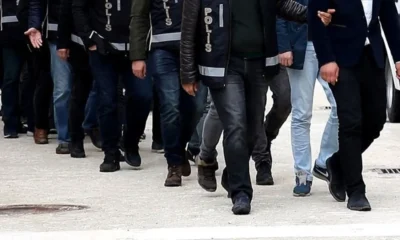
 Daily Agenda3 days ago
Daily Agenda3 days agoLast minute: FETÖ Operation in TSK in 41 provinces: 174 of the muvazzaf, 176 soldiers detention decision
-
Daily Agenda3 days ago
It is not that disappointment
-
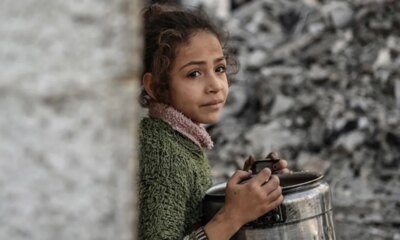
 Daily Agenda3 days ago
Daily Agenda3 days agoUN: Children in Gaza may die of thirst
-
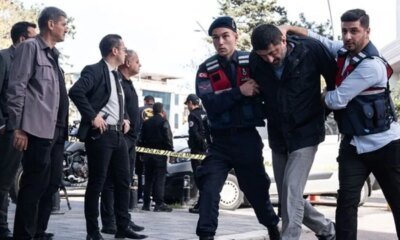
 Daily Agenda3 days ago
Daily Agenda3 days agoNEW BY NEWSHIP GOK INVESTIGATION NEW DEVELOPMENT! 100 years imprisonment request
-
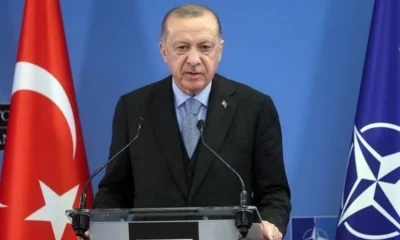
 Daily Agenda3 days ago
Daily Agenda3 days agoLast minute | Critical NATO Summit in the critical process: President Erdoğan also participates! 3 IMPORTANT MESSAGES FROM ANKARA
-
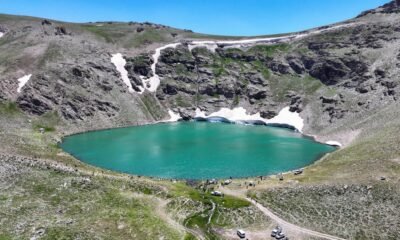
 Lifestyle2 days ago
Lifestyle2 days agoVan’s Çalyan glacier lake draws nature fans to eastern Türkiye
-
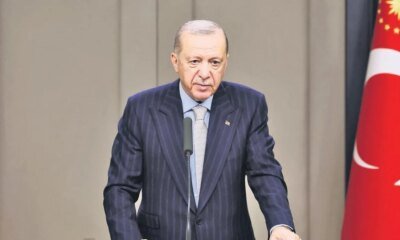
 Daily Agenda2 days ago
Daily Agenda2 days agoOur region cannot lift the burden of war – last minute news
-
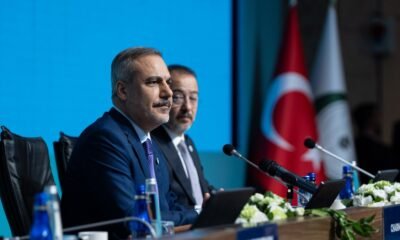
 Politics2 days ago
Politics2 days agoFM Fidan, Chinese FM discuss 2-state solution, regional developments




